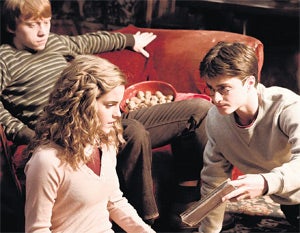Harry Potter and the Half-Blood Prince (12A)

This film is a bit like a summer cold: you just have to sit there while it runs its course.
Not so for the fans. It might as well have been called "Harry Potter and the Half-Baked Potato" and they'd still flock to it in their millions. Advance word suggested that this sixth instalment of the HP franchise would be darker than its predecessors, and the early scenes of London under attack – the Millennium Bridge popping its rivets and collapsing into the Thames is a sight to behold – seemed to bear it out.
That touch of the night in Harry flatters to deceive, I'm afraid. This tries to summon the shadows, and ends its climactic confrontation with a death, but what goes on in between is surprisingly tame. Harry, now so famous that pretty waitresses make eyes at him, is girding his loins for the coming battle with Lord of Evil, Voldemort. To this end our hero is required to uncover secrets from Voldemort's youth, when he lived under the name Tom Riddle; the keeper of those secrets turns out to be a dotty professor of potions, Horace Slughorn (Jim Broadbent), who has been lured back to Hogwarts Academy by Harry's mentor, the wily Dumbledore (Michael Gambon).
Did I mention loins? The fresh-faced innocents of Hogwarts are now in late teenage, and the urge to ride something more than a Quidditch broomstick is becoming apparent. Yet here, too, the film introduces a hormonal element only to back away from it. Harry is supposedly attracted to Ginny Weasley (Bonnie Wright), sister of his best friend Ron (Rupert Grint), but the film-makers seem terrified of letting their hero off the leash, despite Daniel Radcliffe's very public baring of his loins on stage. Hermione Granger (Emma Watson) is also smouldering with unspoken feelings for Ron, himself reluctantly caught up with a ditzy miss named Lavender. Perhaps adolescent audiences are already obliged to cope with more screen sex than they know what to do with. But whether due to the film-makers' playing safe or else a reticence on J K Rowling's part, this is very much HP without the sauce.
The suspicion also persists that, if you don't know the Rowling books, you'll struggle to make sense of the films. The sudden changes of scene tend to baffle, and the transformations are passed over as if they ought to be immediately comprehensible. At one point, the malevolent Draco Malfoy discovers Harry eavesdropping on him, concealed within a suitcase (huh?), which he zaps with his wand and then proceeds to give Harry a savage kicking. Somehow the latter is rescued by a girl with X-ray vision (eh?), and nothing more is said of the incident. What's very distracting is the film's ragged storytelling. It seems to lurch from one set-piece, one vignette, to the next, without really threading them together. One never enjoys the sense of a narrative flow. This is perhaps a consequence of its anything-goes approach to "magic", the unstable element in which HP is immersed. While the effects look polished, they are deployed so indiscriminately that their impact is nullified.
The same scattergun approach is applied to the casting. The margins of the film swarm with British character actors, awarded either two-minute slots (David Bradley, Helen McCrory, David Thewlis, Helena Bonham Carter) or blink-and-you-miss-them cameos (Timothy Spall, Mark Williams, Gemma Jones). None of the older generation makes any real mark, aside from Gambon, Broadbent and Alan Rickman, reprising his vampiric Severus Snape and leaving a space between each line wide enough to drive a lorry through. The Dickensian exuberance that once animated Rowling's ghoulish and humorous invention has been mislaid; instead of comedy we are offered a fey whimsicality, signalled by the woodwind fluting over the score.
The longueurs and sluggish pace would have been forgiven and perhaps forgotten if the story's central trio caught one's imagination. But they convey no more than bog-standard competence as actors, and in Daniel Radcliffe's case sometimes not even that. The owl-faced one struggles to impose himself on a role that demands the heroic minimum of courage and resilience, plus the undercurrents of adolescent insecurity, unhappiness and resistance to his fated role as the Chosen One. Radcliffe's basic mode is meek bemusement, which would be fine once in a while but is hardly touched with complexity.
The seventh and final instalment of the series is due to appear next year – crushingly – in two parts. Would it go very much against the popular grain to suggest that the series has been fat with hype and starved of thrills? Silly question. But next to something like The Lord of The Rings trilogy it does look underpowered; in terms of acting it's not in the same league.
Subscribe to Independent Premium to bookmark this article
Want to bookmark your favourite articles and stories to read or reference later? Start your Independent Premium subscription today.

Join our commenting forum
Join thought-provoking conversations, follow other Independent readers and see their replies